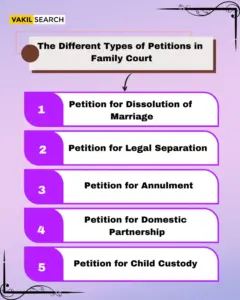Discover the process of petitioning in a Family Court, covering case types and legal nuances essential for addressing family-related issues effectively.
Important provisions of the Family Courts Act, 1984
On September 14, 1984, the Family Courts Act 1984 was enacted. The act consists of six chapters and 23 sections. The law was passed for the purpose of establishing a Petition in Family Court for the rapid and safe resolution of disputes arising in family and marriage and the matters associated in addition to that. Now let’s discuss the types of petitions in family court,
Establishment of Family Courts in India
As per Section 3 of this act, after consultation with the High Court, the State government may establish Family Courts in every area of the state where the population exceeds 1 million or where the State government deems necessary. Upon consultation with the High Court, the State government shall determine the extent of the family court’s jurisdiction. The court may also reduce, increase, or alter such limits.
Introduction to Petition
A petition is a written request to the court for relief from a legal problem. A petitioner is a person who files the petition; the respondent is the person who responds to the petition. In cases involving divorce, child custody, or domestic violence, petitions are typically filed by one spouse against the other in family court.
Types of Petitions in Family Court
In family court, a variety of petitions may be filed. The most common of these include:
- Divorce petitions
- Custody petitions
- Visitation petitions
- Child support petitions
- Spousal support petitions
Each type of petition has its own specific requirements and procedures. An experienced family law lawyer can help you determine which type of petition is right for your situation and guide you through the process.
What You Need to Understand About Each Type?
When it comes to filing a petition in family court, there are different types that you can file. It is important to understand the different types of petitions so that you can choose the right one for your case.
The following is a brief overview of the different types of petitions that you can file in family court.

Petition for Dissolution of Marriage
This type of petition is filed when you want to dissolve your marriage. You will need to state the grounds for dissolution and provide other relevant information about your marriage that supports your case.
Petition for Legal Separation
This type of petition is filed when you want to legally separate from your spouse. You will need to state the grounds for separation and provide reasonable information to the court regarding the same.
Petition for Annulment
This type of petition is filed when you want to have your marriage annulled. You will need to state the grounds for annulment and file a petition satisfying the grounds for nullity of marriage Alimony laws in India.
Petition for Domestic Partnership
This type of petition is filed when you want to dissolve your domestic partnership. You will need to state the grounds for dissolution and provide other information about your domestic partnership.
Petition for Child Custody
This type of petition is filed when you seek the court to grant you custody of the child. However, with the key intent for the welfare of the children, the court considers the environment and mental condition when deciding on custody.
Some Relevant Information and Tips for Certain Types
Divorce petitions and child custody petitions are the two most common family court petitions. Various types of petitions can be filed within these categories. Suppose you are thinking about filing a petition in family court.
In that case, you should be aware of the various types of petitions available and what each one entails.
Divorce petition in Family Court can be either uncontested or contested. An uncontested divorce is one in which both parties agree to the divorce terms, such as the division of property and custody of children. A contested divorce is one in which the parties do not agree on all terms and must have a trial to resolve the issues.
Uncontested or contested child custody petitions are also possible.
- An uncontested child custody petition means that both parents agree on who will have primary custody of the child or children.
- A contested child custody petition indicates that the parents cannot agree on who should have primary custody. A judge will decide based on what is best for the child or children.
Conclusion
Before 1984, all family matters were heard by ordinary civil court judges who often took a long time to provide relief to parties. However, a statute was passed in 1984 which established the Family Courts Act. By passing this act, the goal was to remove family and marital disputes from the overburdened and traditional courts of law.
This was so that a layperson could also understand the court’s procedures. The act’s primary purpose was to promote a settlement between the parties and provide them with speedy relief by following a conciliatory approach. However, these objectives were not achieved. The conclusion has been reached that a quick fix is a myth. For the smooth operation of the family court: https://districts.ecourts.gov.in/, various measures must be taken. To answer your queries more, get in touch with Vakilsearch. Legal is now simple.
Frequently Asked Questions
1. What is petition A in Family Court meaning?
Petition A in Family Court refers to the initial application or plea submitted to initiate legal proceedings related to family matters. It outlines the petitioner's grievances or demands and serves as the foundation for the case.
2. What is a petition under section 13 of the Family Court Act?
A petition under Section 13 of the Family Court Act typically pertains to seeking a decree of divorce. It outlines the grounds on which the petitioner is seeking the dissolution of marriage and other relevant details.
3. Can a review petition be filed in Family Court?
Yes, a review petition can be filed in a Family Court under certain circumstances, seeking a re-evaluation or reconsideration of the court's decision. However, the grounds for filing a review petition are limited.
4. What type of case is a divorce case?
A divorce case is a legal proceeding initiated to dissolve a marriage legally. It involves presenting evidence and arguments to establish the grounds for divorce as specified in family law.
5. What are the three types of petition?
There are various types of petitions, but broadly, they can be categorized into three types: Civil Petitions, Criminal Petitions, and Public Interest Petitions.
6. What is a petition and its types?
A petition is a formal request or application made to a court or authority. Types of petitions include Writ Petitions, Public Interest Litigation (PIL) Petitions, Criminal Petitions, etc.
7. What is a divorce petition under section 13(1)(a)?
A divorce petition under Section 13(1)(a) typically refers to a petition filed on the grounds of cruelty as specified in the Family Courts Act. Cruelty can be a valid reason for seeking a divorce.
8. What is Section 24 in Family Court?
Section 24 of the Family Courts Act pertains to maintenance. It allows either spouse to seek interim maintenance during the pendency of the divorce proceedings.
9. What are the rules of the Family Court Rule 13?
Family Court Rule 13 may vary by jurisdiction. It often pertains to the procedural rules governing the filing, presentation, and handling of petitions in family court.
10. Can a court reject a petition?
Yes, a court can reject a petition if it does not comply with legal requirements, lacks merit, or is improperly filed. However, the court typically provides reasons for rejection.
11. What is the time limit for a review petition?
The time limit for filing a review petition varies by jurisdiction and the nature of the case. It is essential to check the specific rules applicable in the concerned court.
12. What is the success rate of a review petition?
The success rate of a review petition depends on various factors, including the grounds cited for review and the strength of the arguments presented. Success rates can vary.
13. What can a wife claim in divorce?
In a divorce case, a wife can claim various reliefs, including alimony, child custody, and a share in matrimonial property, depending on the applicable laws and circumstances.
14. Can divorce be one-sided?
Yes, a divorce can be initiated unilaterally by one spouse. If one party wishes to end the marriage, they can file a divorce petition, making it a one-sided decision.
15. What is the final part of a divorce?
The final part of a divorce is the issuance of a divorce decree by the court, legally terminating the marriage. This decree outlines the terms of the divorce, including custody and financial arrangements.
16. What are the steps of a petition?
The steps of a petition include drafting the petition, filing it with the appropriate court, serving notice to the opposing party, responding to any counter-petitions, presenting evidence, and attending hearings.
17. How many signatures does a petition need?
The number of signatures required for a petition varies based on the nature of the petition and the rules of the jurisdiction in which it is filed. Some petitions may not require signatures.
18. What is the purpose of a petition?
The purpose of a petition is to formally request a court or authority to take a specific action or address a particular issue. It serves as a legal document expressing the petitioner's grievances or demands.




